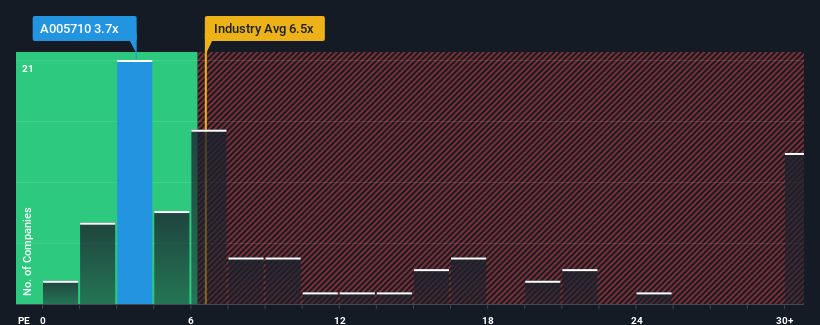- South Korea
- /
- Auto Components
- /
- KOSDAQ:A005710
Daewon Sanup Co., Ltd's (KOSDAQ:005710) Shares Bounce 30% But Its Business Still Trails The Market
The Daewon Sanup Co., Ltd (KOSDAQ:005710) share price has done very well over the last month, posting an excellent gain of 30%. Looking further back, the 20% rise over the last twelve months isn't too bad notwithstanding the strength over the last 30 days.
In spite of the firm bounce in price, Daewon Sanup's price-to-earnings (or "P/E") ratio of 3.7x might still make it look like a strong buy right now compared to the market in Korea, where around half of the companies have P/E ratios above 13x and even P/E's above 25x are quite common. Although, it's not wise to just take the P/E at face value as there may be an explanation why it's so limited.
With earnings growth that's exceedingly strong of late, Daewon Sanup has been doing very well. One possibility is that the P/E is low because investors think this strong earnings growth might actually underperform the broader market in the near future. If you like the company, you'd be hoping this isn't the case so that you could potentially pick up some stock while it's out of favour.
See our latest analysis for Daewon Sanup

What Are Growth Metrics Telling Us About The Low P/E?
There's an inherent assumption that a company should far underperform the market for P/E ratios like Daewon Sanup's to be considered reasonable.
Taking a look back first, we see that the company grew earnings per share by an impressive 67% last year. Still, EPS has barely risen at all from three years ago in total, which is not ideal. So it appears to us that the company has had a mixed result in terms of growing earnings over that time.
Weighing that recent medium-term earnings trajectory against the broader market's one-year forecast for expansion of 26% shows it's noticeably less attractive on an annualised basis.
With this information, we can see why Daewon Sanup is trading at a P/E lower than the market. Apparently many shareholders weren't comfortable holding on to something they believe will continue to trail the bourse.
The Final Word
Daewon Sanup's recent share price jump still sees its P/E sitting firmly flat on the ground. Using the price-to-earnings ratio alone to determine if you should sell your stock isn't sensible, however it can be a practical guide to the company's future prospects.
We've established that Daewon Sanup maintains its low P/E on the weakness of its recent three-year growth being lower than the wider market forecast, as expected. At this stage investors feel the potential for an improvement in earnings isn't great enough to justify a higher P/E ratio. Unless the recent medium-term conditions improve, they will continue to form a barrier for the share price around these levels.
Many other vital risk factors can be found on the company's balance sheet. Our free balance sheet analysis for Daewon Sanup with six simple checks will allow you to discover any risks that could be an issue.
If you're unsure about the strength of Daewon Sanup's business, why not explore our interactive list of stocks with solid business fundamentals for some other companies you may have missed.
New: Manage All Your Stock Portfolios in One Place
We've created the ultimate portfolio companion for stock investors, and it's free.
• Connect an unlimited number of Portfolios and see your total in one currency
• Be alerted to new Warning Signs or Risks via email or mobile
• Track the Fair Value of your stocks
Have feedback on this article? Concerned about the content? Get in touch with us directly. Alternatively, email editorial-team (at) simplywallst.com.
This article by Simply Wall St is general in nature. We provide commentary based on historical data and analyst forecasts only using an unbiased methodology and our articles are not intended to be financial advice. It does not constitute a recommendation to buy or sell any stock, and does not take account of your objectives, or your financial situation. We aim to bring you long-term focused analysis driven by fundamental data. Note that our analysis may not factor in the latest price-sensitive company announcements or qualitative material. Simply Wall St has no position in any stocks mentioned.
About KOSDAQ:A005710
Daewon Sanup
Manufactures and sells automobile seats in South Korea, China, Russia, and internationally.
Flawless balance sheet with solid track record.
Market Insights
Community Narratives



